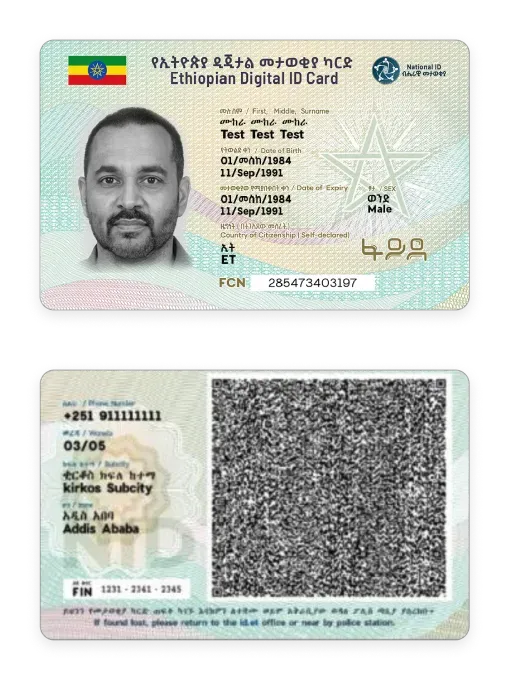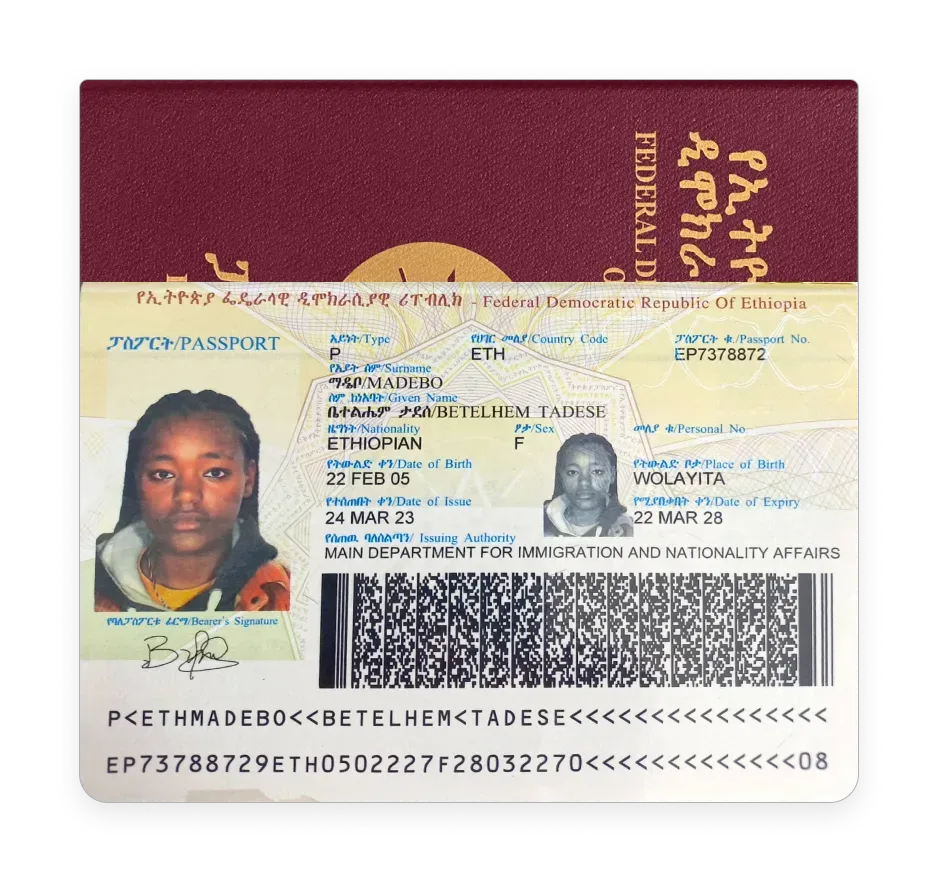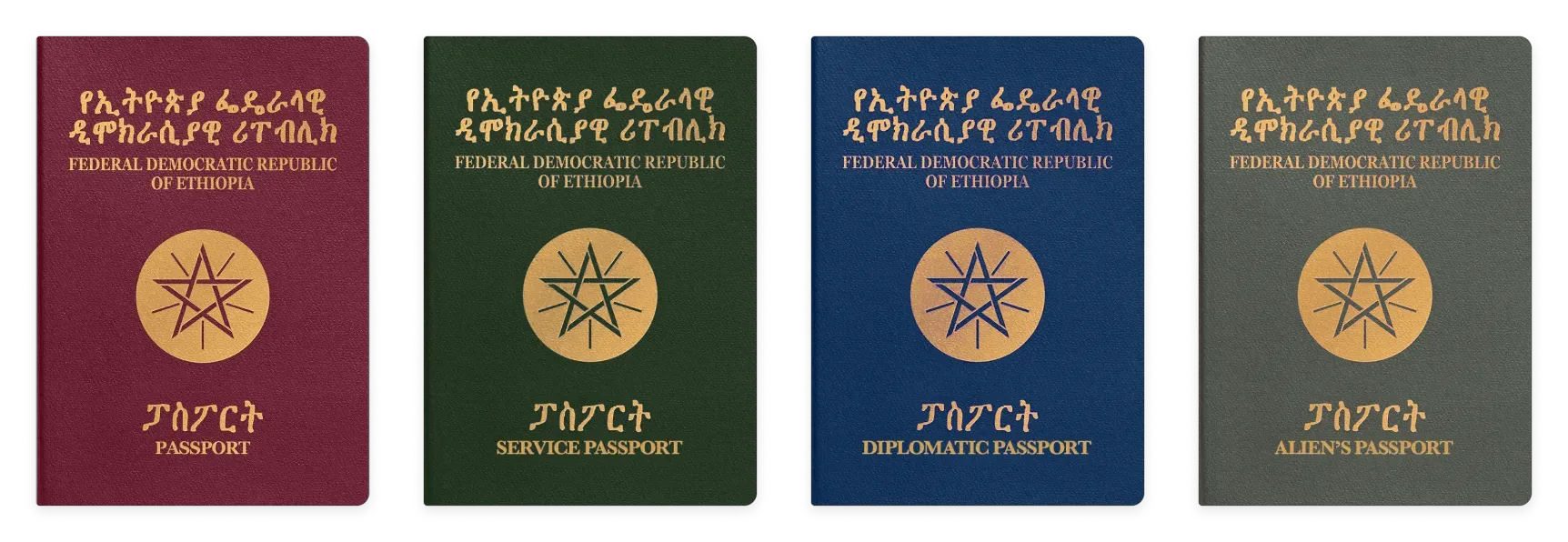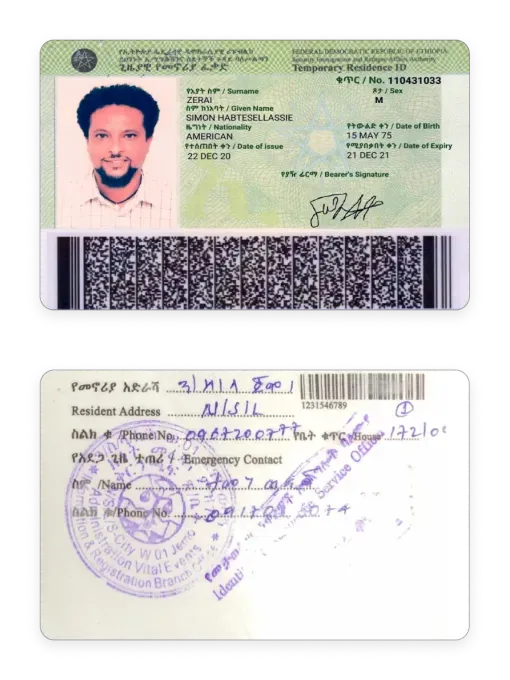
Identity Verification, KYC, and AML Compliance in Ethiopia
Key takeaways
Ethiopia has enacted laws like Proclamation No. 1176/2020 to align its KYC and AML regulations with international standards, enhancing financial security.
Identity verification faces challenges such as lack of document standardization and limited security measures, emphasizing the need for advanced technological solutions.
Essential documents like Fayda, passports, and residence permits are crucial for KYC processes in Ethiopia, though they present technical and operational challenges.
Didit offers a free and unlimited solution that combines artificial intelligence, facial recognition, and AML screening to revolutionize identity verification in Ethiopia.
Identity verification and compliance with KYC (Know Your Customer) and AML (Anti-Money Laundering) regulations have become foundational pillars for ensuring the integrity of Ethiopia's financial system. With a growing population and an expanding economy, businesses looking to operate in the country must adhere to stringent regulations to prevent financial fraud, such as money laundering or terrorist financing.
Ethiopia, an active member of the Financial Action Task Force (FATF) and the Eastern and Southern African Anti-Money Laundering Group (ESAAMLG), has made significant progress in its internal KYC and AML regulations to align with international standards.
Developing a robust legal framework for prevention has been essential in facilitating financial inclusion and securing transactions. The implementation of digital identity verification systems, such as the national digital ID known as Fayda, has optimized the digital onboarding of numerous clients, helping businesses meet regulatory demands safely and efficiently. However, numerous challenges remain, primarily related to document standardization and advanced security measures in identity verification.
In this article, we will delve into the legal framework for KYC and AML in Ethiopia, the challenges businesses face when verifying the identities and documents of individuals in the country, and how Didit is transforming these processes with innovative AI-based technologies.

The Legal Framework for KYC and AML in Ethiopia: Regulatory Requirements
KYC and AML regulations in Ethiopia have advanced to align with international standards. The current regulatory framework aims not only to prevent illicit activities within the country but also to strengthen trust in the state's financial system.
Money Laundering and Terrorist Financing Prevention and Sanctions Proclamation
Proclamation No. 1176/2020 serves as the cornerstone of all KYC and AML regulations in Ethiopia. This law sets the requirements for customer identification and verification, defining the obligations of financial institutions to prevent money laundering and terrorist financing. Additionally, alongside this regulation, the Financial Intelligence Center (CIF) was established to oversee and coordinate all compliance activities.
Know Your Customer (KYC) Directives
The National Bank of Ethiopia has issued specific directives for banking institutions, detailing the procedures for Customer Due Diligence (CDD). These guidelines require financial institutions to conduct thorough verifications of their clients, adapting processes based on the risk profile associated with each individual.
Data Protection Framework
The Ethiopian Data Protection Directive (DPD), managed by the Ethiopian Information Security Agency (INSA), regulates the processing and transfer of personal data. Companies must obtain explicit consent from users before handling personal information, ensuring both data security and privacy.
Regional and International Cooperation Regulations
As a full member of the Eastern and Southern Africa Anti-Money Laundering Group, Ethiopia closely collaborates with other regional countries to harmonize its AML/CFT policies. This legislative cooperation facilitates information exchange and best practices, thereby enhancing the country's ability to effectively combat illicit financial activities.
Identity Verification: A Challenge for Businesses
Identity verification in Ethiopia presents numerous challenges for businesses operating in the country. The lack of a robust digital infrastructure is the primary hurdle. The diversity of identity documents and variability in their issuance further complicates the verification process, making a standardized and efficient identity verification system nearly impossible. Fayda, one of the proposed digital systems, requires significant investments in technology and training, which can be unfeasible for small and medium-sized enterprises aiming to operate legally in the country.
Challenges in Document Verification in Ethiopia
Document verification in Ethiopia must address several obstacles that impact the effectiveness of KYC and AML processes in the country. What are the main challenges?
- Lack of Standardization: Although there are key documents for identity verification, they do not always follow a standardized format. The design and information contained in each document can vary, complicating the automation of verification processes.
- Diversity of Documents: Ethiopia has numerous valid identification documents, such as the National ID, Passport, or Residence Cards. While this variety may be user-friendly, it poses challenges for identity verification tools, as systems must recognize and validate these different formats.
- Insufficient Security Measures: Not all national documents meet the International Civil Aviation Organization (ICAO) security standards. Common security features like RFID chips or holographic elements are not universally implemented.
- Training and Knowledge: The lack of specialized training in anti-money laundering can lead to errors or inefficiencies in document verification. It is essential that solutions entering the market to verify Ethiopian documents are user-friendly and easy to use.
Key Documents in Ethiopia for Identity Verification: Fayda, Passport, and Residence Permit
- National ID or Fayda: This is the most important document for identity verification and KYC in Ethiopia. With limited adoption so far due to technological scalability issues, it is expected to soon become the national standard, facilitating identity verification.

- Passport: Issued by the Ethiopian Ministry of Foreign Affairs, it is widely used for identity verification, especially in international transactions. It is a highly reliable document for businesses.

- In Ethiopia, there are four different types of passports: Ordinary, Service, Diplomatic, and for Foreigners.

- Residence Card: For foreigners residing in Ethiopia, the Residence Card is the most convenient way to verify their legal status in the country. Issued by the Principal Department of Immigration and National Affairs, this documentation has a limited validity, usually less than 90 days, requiring periodic renewals and validations.

Didit: Transforming Identity Verification and KYC and AML Compliance in Ethiopia
Facing challenges in identity verification and KYC and AML compliance in Ethiopia, Didit emerges as the optimal solution. We leverage proprietary artificial intelligence technologies applied to document verification and facial recognition to ensure identity verification in the country, providing businesses with a reliable, secure, and efficient tool. Best of all, it’s free. Because Didit's KYC solution is the first and only in the market to offer a free and unlimited service.
How Does Didit Verify Identity in Ethiopia?
Didit uses artificial intelligence algorithms capable of validating and verifying over 3,000 different types of documents from more than 220 countries and territories, including Ethiopia. Our system detects inconsistencies and extracts information accurately, adapting to Ethiopia's complex documentary reality. Learn more about the document verification process.
Additionally, Didit implements customized AI models that go beyond simple face matching during the facial recognition phase. We have multiple liveness detection systems, both active and passive, ensuring that the person being identified is genuinely who they claim to be. This significantly reduces the risks of document fraud.
Moreover, we offer an AML Screening service that allows businesses to conduct real-time checks against over 250 global data sets, searching for Politically Exposed Persons (PEPs), sanctions, or adverse news. This process enables businesses to comply with AML regulations in Ethiopia, ensuring there is no suspicious transaction history.
What Official Documentation Does Didit Verify in Ethiopia?
Didit verifies Ethiopia’s main official identity documents, such as Fayda (National ID), passport, or residence permit. This way, with Didit, businesses that need it can offer a faster and more secure digital onboarding process in Ethiopia, complying with all current regulations.
Ready to transform your KYC process? Don’t wait any longer: click the banner below to ensure your regulatory compliance while minimizing operational costs.
